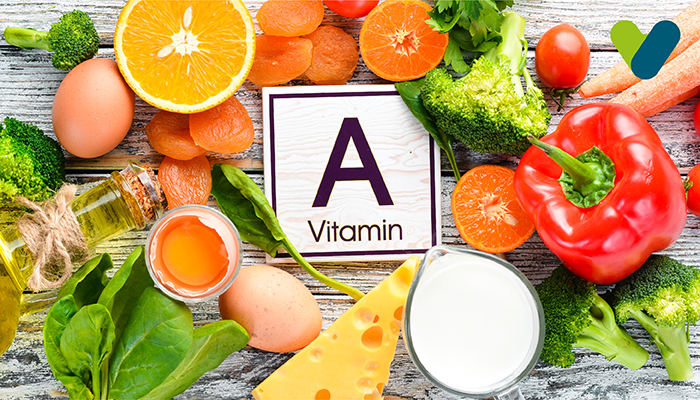Simran was taking a class in the school while she was seated in the last row. When the teacher started writing on board, she could not see the text written on board; her vision was getting blurred. Shen then went home and told this to her mother, and her mother said to her that maybe her eyesight was the week they went to see a doctor. The doctor also said that because her eyes kept on concentrating on electronic devices, her vision got blurred and advised her to intake the best eye vitamins for blurry vision as it is crucial for excellent eyesight because it protects the eye's surface (cornea).
What Is Vitamin A and What Does It Do?
Vitamin A is a collection of antioxidant molecules that help with eyesight, bone development, and immune system function. Vitamin A also aids in the formation of efficient barriers to bacteria or viruses on the surface of the eye, mucous membranes, and skin, lowering the risk of eye infections, respiratory difficulties, and other infectious disorders.In general, depending on the kind of dietary supply, there are two forms of vitamin A:
- Retinol is a kind of vitamin A obtained from animal products. The body may immediately utilize this "preformed" vitamin A. Beef, and chicken liver, whole milk, and cheese are all excellent sources of retinol vitamin A.
- Vitamin A is found in "provitamin A" carotenoids in coloured fruits and vegetables, which the body converts to retinol after consumption. Carrots, sweet potatoes, spinach, kale, and cantaloupes are all excellent sources of provitamin A carotenoids.
Vitamin A and Beta-Carotene Healthy Eye Benefits
- Vitamin A eye drops are helpful in the treatment of dry eyes in studies. One research revealed that over-the-counter lubricating eye drops containing vitamin A were just as efficient as more expensive prescription eye drops for dry eye relief in treating dry eye syndrome.
- Vitamin A eye drops have also been proven to be beneficial in treating superior limbic keratoconjunctivitis, a kind of eye inflammation.
- Vitamin A, at least when combined with other antioxidant vitamins, appears to help reduce the risk of macular degeneration-related visual loss (AMD).
- In those with retinitis pigmentosa, a combination of vitamin A and lutein appears to help them see longer (RP).
- Because beta-carotene is converted to vitamin A in the body, this provitamin A likely has similar eye advantages as preformed retinol vitamin A. However, further study is needed to prove this.
- A synthetic, altered form of vitamin A discovered by Columbia University Medical Center researchers may be able to delay the course of Stargardt's disease. This genetic eye illness causes significant vision loss in young individuals.
- The researchers have been given a $1.25 million grant from the National Eye Institute to continue their research into the relationship between vitamin A dimers and various retinal degenerations, leading to novel treatments for these disorders.
Vitamin A - Daily Value
The Daily Value (DV) was developed to assist customers in determining whether a food contains a large amount or a small amount of a nutrient centred on its Recommended Dietary Allowance. Vitamin A has a daily value of 5,000 IU.The DV percentages for some of the finest vitamin A foods are shown in the tables below:
| Food | Vitamin A (IU) | %DV |
| Braunschweiger (pork liver sausage, 2 slices) | 7,967 | 159.3 |
| Beef liver (3 ounces, cooked) | 22,175 | 443.5 |
| Chicken liver (1 liver, cooked) | 2,612 | 52.2 |
| Milkshake (16 fluid ounces) | 1,012 | 20.2 |
| Ricotta cheese (1 cup) | 945 | 18.9 |
| Butter (1 tablespoon) | 355 | 7.1 |
| Whole milk | 395 | 7.9 |
VITAMIN-A FOODS (PLANT-BASED)
| Food | Vitamin A (IU) | %DV |
| Sweet potato (baked, 1 potato) | 28,058 | 561.2 |
| Pumpkin (canned, 1 cup) | 38,129 | 762.6 |
| Carrot juice (canned, 1 cup) | 45,133 | 902.6 |
| Carrots (cooked, 1 cup) | 26,571 | 531.4 |
| Spinach (raw, 1 cup) | 2,813 | 56.3 |
| Cantaloupe (natural, 1/8 melon) | 2,334 | 46.7 |
| Carrots (raw, 1 carrot) | 12,028 | 240.6 |
Vitamin A Deficiency
- In the United States, vitamin A insufficiency is uncommon, but it is widespread among the impoverished in developing nations. Every year, between 250,000 and 500,000 malnourished children worldwide are blind owing to vitamin A deficiency, which may have been avoided with an intake of vitamins for eye health.
- Vitamin A deficiency enables the cornea to become dry, resulting in front-of-the-eye clouding, corneal ulcers, and vision loss. Vitamin A deficiency causes damage to the retina, leading to blindness.
- Vitamin A deficiency can lead to respiratory and other illnesses mortality since it is necessary for infection resistance and a strong immune system.
Vitamin A Toxicity
- Vitamin A obtained from animal sources is not water-soluble; thus, it is not easily eliminated from the body. Instead, it is stored in body fat, which may pile up and become hazardous if consumed in large amounts.
- Beta-carotene and other provitamins A carotenoids present in fruits and vegetables do not cause vitamin A poisoning the same way as vitamin A does. Vitamin A poisoning from vegetarian dietary sources is uncommon since these molecules are water-soluble and quickly removed from the body.
- Supplements containing beta-carotene, on the other hand, may pose substantial health hazards to smokers. According to two trials, smokers who took regular supplements containing 20 to 30 mg of beta-carotene had a higher risk of lung cancer in contrast to those who did not need to use eye supplements.
